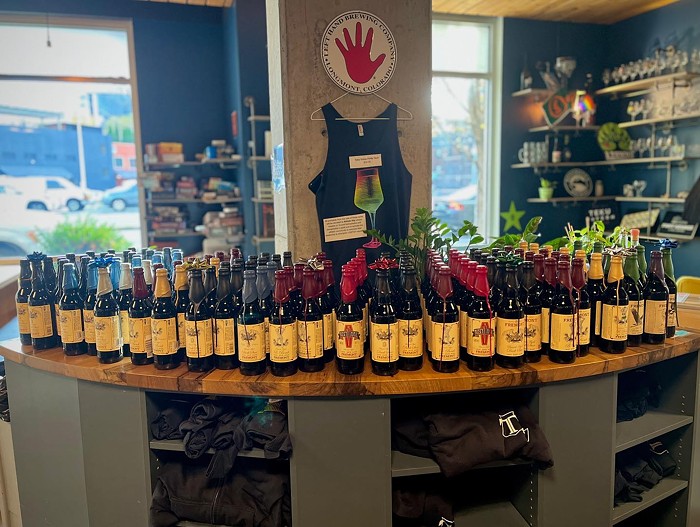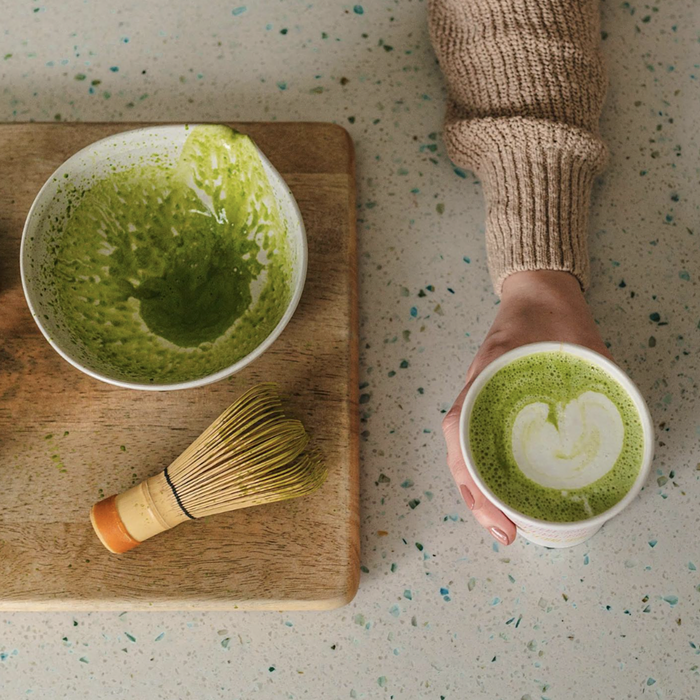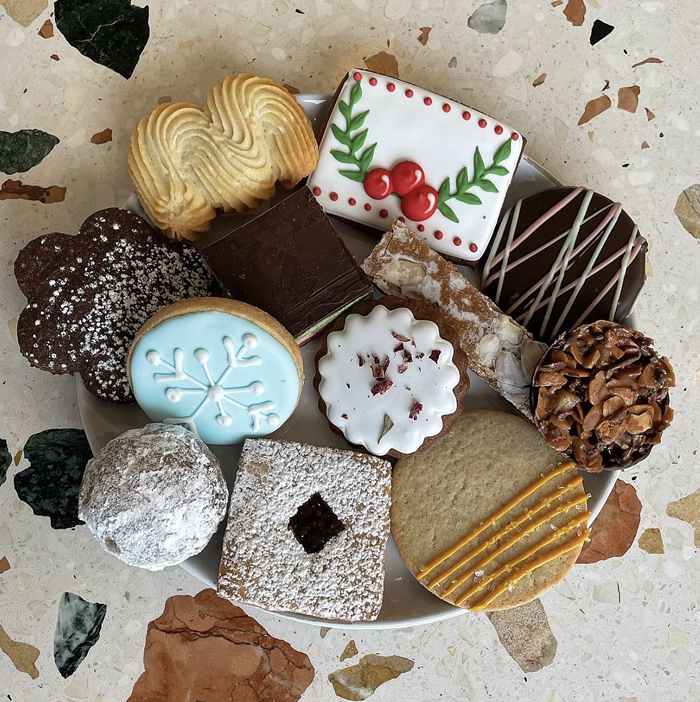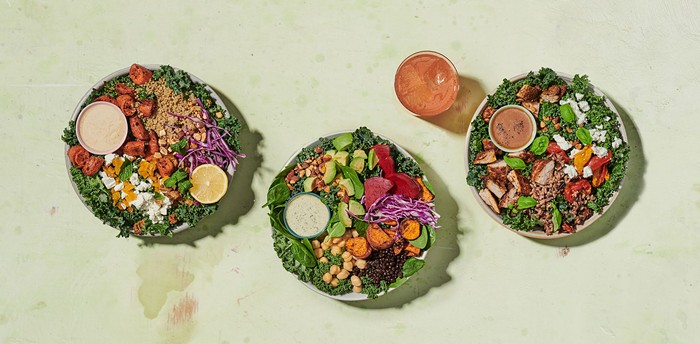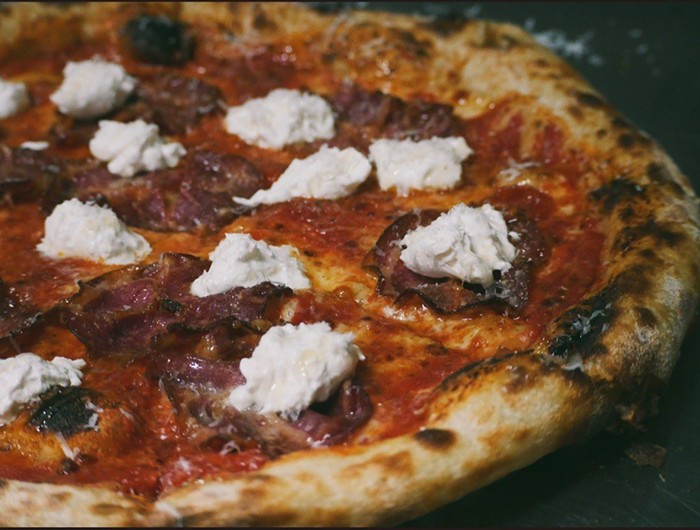Fuji Bakery in the International District does not have that bakery smell—all the baking takes place at the original Bellevue location. The buttercup-yellow walls and tinny jazz seem arbitrary, and there's no seating, even though an entire corner gapes mournfully open with not so much as a fern to fill it. Lacking tables and chairs, some folks make use of a low ledge along the windows, just deep enough to perch on.
None of this matters. What matters is happening behind the pastry case—a sheet of curved glass so tall that it's initially disorienting (flashbacks of bank tellers and DMV workers). If the light is right, you can see yourself in it. Customers—a trio of stylish ladies wearing paper masks, a jocular gang of Amazon employees—fire off orders with businesslike intensity. The smiling woman behind the glass quickly reaches for tongs and a paper-lined basket, plucking treats with precision.
Head baker Taka Hirai spent three years as a pastry chef with Joël Robuchon at his three-Michelin-starred restaurant in Tokyo, and this expertise is reflected in everything at Fuji (except maybe the decor). They use a particular European cultured butter, selected after a painstaking search. They make their own yeast, which accounts for the varying selection (there's no better reason for a missing item than waiting for the yeast to properly culture—go ahead, take your time, Fuji). The breads are all natural, without additives or preservatives. If you're obsessed with the source of ingredients, ask—they know, and they're happy to tell you.
The savory items showcase Fuji's blend of European forms and Japanese flavors. The spicy beef curry "piroshiki" ($2.99) has a deep-fried scent that recalls the better days of the county fair. The filling could be spicier, but that's fine; it's the texture of pillowy bun, coated with panko and fried in canola oil until it crackles, that makes it seriously good. An excellent focaccia bun (99 cents!) sprinkled with rosemary and Portuguese sea salt is more like a petite brioche, with a chewy, pull-apart texture and a buttery, crunchy disk on the bottom. The Volcano Cheddar (also 99 cents), a bun bursting open with cheese, is slightly dry, but arguably redeemed by a cracker of baked cheese pooled around the edges. An epi roll made with yuzu (a Japanese citrus) and bacon ($2.50) is a little dry as well; it's a bit of a chore to chew, and it doesn't have quite enough yuzu.
Sandwiches are endearingly, refreshingly small (for lunch, you may want two). The Mentaiko Butter ($2.99), a mini-baguette with a smear of marinated pollack roe blended with shiso and butter, manages to taste fresh yet intensely rich—it should be tried by everyone, especially those with an irrational prejudice against roe. The Chocolat Button ($2.50) comes with two flat sticks of dark chocolate, almonds peeking out like shark fins, and drops of balsamic reduction—it's the classic French after-school snack, all grown up. The Milk Stick ($1.50) is not at all as weird as it sounds, but sweet and fresh and perfect. It's a softer, thinner baguette with a housemade spread of condensed milk, butter, and vanilla; they're displayed in a cute and tidy stack, each one ringed with a dainty paper band. More typical baguette sandwiches—salmon and avocado, prosciutto and Brie, caprese (all $2.99)—satisfy the lunchtime protein hunter.
Cookie Bread ($1.50)—lemon vanilla, green tea, and "frambo" (raspberry with white chocolate)—has a crunchy, sugary shell (the cookie) and a soft interior (the bread), and it's good enough to raise the possibility of more pastry mashups (Tart Cake? Pie Roll?). A Kouign-amann ($2.50), come to find out, is a Breton-style drum of flaky pastry that gives way to an interior of pure apple goodness. It's caramelized to a tooth-sticking degree and surprises with an earthy injection of cardamom.
And then there's the croissant ($2.25), the true test of any bakery that dares make them, French or Japanese or otherwise. Will it be like the ones in Paris? In fact, yes: It's just like the ones in Paris. It's perfectly dark-golden-brown and flaky, and its aroma advertises strenuous amounts of butter. It bounces back in slow motion after you bite it.
If red-bean buns and roe sandwiches appeal, have a cup of Japanese green tea. If pain au chocolat and tiny quiches are more your style—and Fuji may do French pastries better than ostensibly French bakeries—they make Caffe D'arte coffee on a handsome copper espresso machine. Fuji Bakery is so damn good, you won't mind having to go elsewhere to sit down; whatever you get probably won't last that long anyway. ![]()
